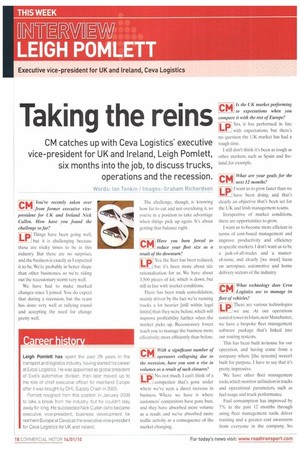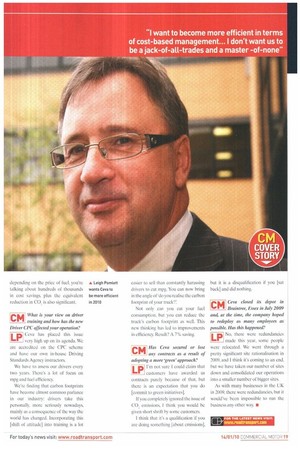Taking the reins
Page 18

Page 19

If you've noticed an error in this article please click here to report it so we can fix it.
CM catches up with Ceva Logistics' executive vice-president for UK and Ireland, Leigh Pomlett, six months into the job, to discuss trucks, operations and the recession.
Words: Ian Tonkin / images: Graham Richardson irku You've recently taken over 14110"wl from former executive vicepresident for UK and Ireland Nick Cullen. How have you found the challenge so far?
LP Things have been going well, but it is challenging because these are tricky times to be in this industry. But there are no surprises, and the business is exactly as I expected it to be. We're probably in better shape than other businesses, so we're riding out the recessionary storm very well.
We have had to make marked changes since I joined. You do expect that during a recession, but the team has done very well at rallying round and accepting the need for change pretty well. The challenge, though, is knowing how far to cut and not overdoing it, so you're in a position to take advantage when things pick up again. It's about getting that balance right.
CM Have you been forced to reduce your fleet size as a result of the downturn?
Yes, the fleet has been reduced, hut it's been more about site rationalisation for us. We have about 3,500 pieces of kit, which is down, but still in line with market conditions.
LP
There has been truck consolidation, mainly driven by the fact we're running trucks a lot heavier [still within legal Inn itsj than they were before, which will improve profitability further when the market picks up. Recessionary forces teach you to manage the business more effectively; more efficiently than before.
CM With a significant number of operators collapsing due to the recession, have you seen a rise in volumes as a result of such closures?
LPNo, not much. I can't think of a competitor that's gone under where we've seen a direct increase in business. Where we have is where customers' competitors have gone bust, and they have absorbed more volume as a result; and we've absorbed more traffic activity as a consequence of the market changing. CM Is the UK market performing to expectations when you compare it with the rest of Europe?
LPYes, it has performed in line with expectations, but there's no question the UK market has had a tough time.
I still don't think it's been as tough as other markets, such as Spain and Ireland, for example.
CM What are your goals for the next 12 months?
I want us to grow faster than we have been doing, and that's clearly an objective that's been set for the UK and Irish management teams. Irrespective of market conditions, there are opportunities to grow.
I want us to become more efficient in terms of cost-based management and improve productivity and efficiency in specific markets. I don't want us to be a jack-of-all-trades and a masterof-none, and clearly [we must] focus on aerospace, automotive and home delivery sectors of the industry.
LP
CM What technology does Ceva Logistics use to manage its fleet of vehicles?
LP There are various technologies we use. At our operations control tower in Ida m, near Manchester, we have a bespoke fleet management software package that's linked into our routing systems.
This has been built in-house for our operation, and having come from a company where [the systems] weren't built for purpose. I have to say that it's pretty impressive.
We have other fleet management tools, which monitor utilisation in trucks and operational parameters, such as fuel usage and truck performance.
Fuel consumption has improved by 7% in the past 12 months through using fleet management tools, driver training and a greater cost awareness from everyone in the company. So, depending on the price of fuel, you're talking about hundreds of thousands in cost savings, plus the equivalent reduction in CO, is also significant.
What is your view on driver "i! training and how has the new Driver CPC affected your operation?
Ceva has placed this issue very high up on its agenda. We are accredited on the CPC scheme and have our own in-house Driving Standards Agency instructors, We have to assess our drivers every two years. There's a lot of focus on mpg and fuel efficiency.
We're finding that carbon footprints have become almost common parlance in our industry: drivers take this personally, more seriously nowadays, mainly as a consequence of the way the world has changed. Incorporating this [shift of attitude] into training is a lot
LP easier to sell than constantly harassing drivers to cut mpg. You can now bring in the angle of do you realise the carbon footprint of your truck?!
Not only can you cut your fuel consumption, but you can reduce the truck's carbon footprint as well. This new thinking has led to improvements in efficiency. Result? A 7% saving.
CM Has Ceva secured or lost any contracts as a result of adopting a more 'green.' approach? I'm not sure I could claim that customers have awarded us contracts purely because of that, but there is an expectation that you do [commit to green initiatives].
If you completely ignored the issue of CO, emissions, I think you would be given short shrift by some customers.
I think that it's a qualification if you are doing something [about emissions],
LP
but it is a disqualification if you [sat back] and did nothing.
CM Ceva closed its depot in Braintree, Essex in July 2009 the time, the company hoped to redeploy as many employees as possible, Has this happened?
LP No, there were redundancies made this year, some people were relocated. We went through a pretty significant site rationalisation in 200% and I think it's coming to an end, hut we have taken our number of sites down and consolidated our operations into a smaller number of bigger sites. and, at As with many businesses in the UK in 2009, there were redundancies, but it would've been impossible to run the business any other way. •




































































































































